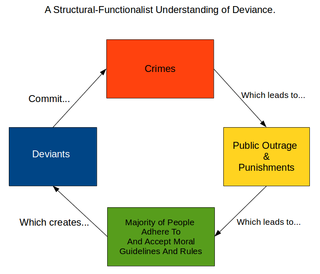A class action, also known as a class action lawsuit, class suit, or representative action, is a type of lawsuit where one of the parties is a group of people who are represented collectively by a member of that group. The class action originated in the United States and is still predominantly a U.S. phenomenon, but Canada, as well as several European countries with civil law have made changes in recent years to allow consumer organizations to bring claims on behalf of consumers.

A defendant is a person accused of committing a crime in criminal prosecution or a person against whom some type of civil relief is being sought in a civil case.
Bail is a set of pre-trial restrictions that are imposed on a suspect to ensure that they comply with the judicial process. Bail is the conditional release of a defendant with the promise to appear in court when required.
A legal fiction is a fact assumed or created by courts, which is then used in order to help reach a decision or to apply a legal rule. The concept is used almost exclusively in common law jurisdictions, particularly in England. An example of a legal fiction outside common law is that it is (legally) possible to have consumed an illegal substance without having owned it. Owning or handling e.g. Cannabis is illegal, testing positive in a drug test is not, even though the former is precondition for the latter.
Probation in criminal law is a period of supervision over an offender, ordered by the court instead of serving time in prison.
Forensic psychology is the application of psychological knowledge and methods to legal questions.
A suspended sentence is a legal term for a judge's delaying of a defendant's serving of a sentence after they have been found guilty, in order to allow the defendant to perform a period of probation. If the defendant does not break the law during that period, and fulfills the particular conditions of the probation, the judge usually dismisses the sentence.
A public defender is a lawyer appointed to represent people who otherwise cannot reasonably afford to hire a lawyer.
Cognitive liberty, or the "right to mental self-determination", is the freedom of an individual to control his or her own mental processes, cognition, and consciousness. It has been argued to be both an extension of, and the principle underlying, the right to freedom of thought. Though a relatively recently defined concept, many theorists see cognitive liberty as being of increasing importance as technological advances in neuroscience allow for an ever-expanding ability to directly influence consciousness. Cognitive liberty is not a recognized right in any international human rights treaties, but has gained a limited level of recognition in the United States, and is argued to be the principle underlying a number of recognized rights.

In England and Wales, a magistrates' court is a lower court which holds trials for summary offences and preliminary hearings for more serious ones. Some civil matters are also decided here, notably family proceedings. In 2015, there were roughly 330 magistrates' courts in England and Wales, though the government was considering closing up to 57 of these. The jurisdiction of magistrates' courts and rules governing them are set out in the Magistrates' Courts Act 1980.
In criminal procedure, an adjournment in contemplation of dismissal allows a court to defer the disposition of a defendant's case, with the potential that the defendant's charge will be dismissed if the defendant does not engage in additional criminal conduct or other acts prohibited by the court as a condition of the ACD. The defendant subject to the adjournment in contemplation of dismissal is restored to the status he or she occupied prior to arrest, either during or after the period of adjournment that accompanies the ACD: that is, all records of the arrest and after the period for which the ACD applies; however, in many jurisdictions a local law enforcement record of the arrest is retained by default, unless that record is explicitly expunged.
A discharge is a type of sentence imposed by a court whereby no punishment is imposed.
Involuntary treatment refers to medical treatment undertaken without the consent of the person being treated. In almost all circumstances, involuntary treatment refers to psychiatric treatment administered despite an individual's objections. These are typically individuals who have been diagnosed with a mental disorder and are deemed by some form of clinical practitioner, or in some cases law enforcement or others, to be a danger to themselves or to others. Some jurisdictions have more recently allowed for forced treatment for persons deemed to be "gravely disabled" or asserted to be at risk of psychological deterioration. Court approval is typically required outside emergencies, although it is widely claimed that courts often act as "rubber stamps" on such matters.
Mental health courts link offenders who would ordinarily be prison-bound to long-term community-based treatment. They rely on mental health assessments, individualized treatment plans, and ongoing judicial monitoring to address both the mental health needs of offenders and public safety concerns of communities. Like other problem-solving courts such as drug courts, domestic violence courts, and community courts, mental health courts seek to address the underlying problems that contribute to criminal behavior.

Forensic social work is the application of social work to questions and issues relating to law and legal systems. This specialty of the social work profession goes far beyond clinics and psychiatric hospitals for criminal defendants being evaluated and treated on issues of competency and responsibility. A broader definition includes social work practice which in any way is related to legal issues and litigation, both criminal and civil. Child custody issues, involving separation, divorce, neglect, termination of parental rights, the implications of child and spousal abuse, juvenile and adult justice services, corrections, and mandated treatment all fall under this definition. Forensic social worker may also be involved in policy or legislative development intended to improve social justice.

Human rights in Andorra are generally respected by the government, and the law and the judiciary provided effective means of dealing with individual instances of abuse. However, prolonged pretrial detention and violence against women and children were reported.

United States federal probation and supervised release are imposed at sentencing. The difference between probation and supervised release is that the former is imposed as a substitute for imprisonment, or in addition to home detention, while the latter is imposed in addition to imprisonment. Probation and supervised release are both administered by the U.S. Probation and Pretrial Services System. Federal probation has existed since 1909, while supervised release has only existed since 1987, when it replaced federal parole as a means for imposing supervision on release from prison.
Hawaii's Opportunity Probation with Enforcement (HOPE) is an intensive supervision program that aims to reduce crime and drug use while saving taxpayers' dollars spent on jail and prison costs. HOPE deals with offenders who have been identified as likely to violate the conditions of their probation or community supervision.
Bail in the United States refers to the practice of releasing suspects from custody before their hearing, on payment of bail, which is money or pledge of property to the court which may be refunded if suspects return to court for their trial. Bail practices in the United States vary from state to state.

Lifetime probation is reserved for relatively serious legal offenders. The ultimate purpose of lifetime probation is to examine whether offenders properly maintain good behavior as well as capability of patience under lifetime probation serving circumstance. An offender is required to abide by particular conditions for his or her entire life in order to nurture superior social behaviour as a punishment for their criminal offence. Condition of probation orders contain supervision, reporting as well as attending counselling. The essential component of lifetime probation carries the sense of being examined for well-being character and behaviour for life term period. Legislative framework regarding probation may vary depending on the country or the state within a certain country as well as the duration and condition of probational sentencing.





